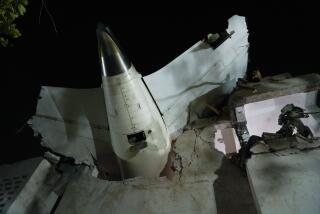Boeing Tests May Shed Light on Two Crashes : Aerospace: Firm is believed to have simulated conditions that led to engines falling off jumbo jets just after takeoff.
- Share via
WASHINGTON — Computer-aided metallurgical tests may have uncovered some clues to help explain the crashes of two Boeing 747 cargo jets in Amsterdam and in Taiwan, according to a published report.
The Washington Post, quoting Federal Aviation Administration officials, said Sunday that Boeing computer simulations found that fuse pins that hold the engines to the wing of the jumbo jet may react under certain conditions in a way that causes them to break long before engineers had anticipated.
FAA officials knowledgeable about the findings could not be reached Sunday.
An agency spokesman, Fred Farrar, said he had no knowledge of the tests reportedly conducted by Boeing Co.
But the Post quoted officials of the FAA and the National Transportation Safety Board as saying the fuse pins on more than 900 Boeing 747s are strong enough to support the engines properly and pose no safety concerns.
However, the Boeing tests showed that if such pins are corroded or have cracks, they may be more susceptible to breaking than previously believed, the newspaper said.
Since the crash Oct. 4 in Amsterdam of a Boeing 747 cargo jet belonging to El Al airline, the FAA and Boeing have required closer inspections of the mounting pins to assure they are not corroded or cracked.
In both the El Al disaster and the crash of a China Airlines 747 in Taiwan on Dec. 21, 1991, an engine ripped away from the wing as the jets were climbing after takeoff.
The Post quoted Anthony Broderick, the FAA’s associate administrator for regulation and certification, as saying the Boeing simulations showed the fuse pins reacting under load in an unexpected way that produced eight to 10 times greater stress than engineers had anticipated.
While crack-free and corrosion-free pins would still hold up, those that might be corroded or cracked could break, the newspaper said.
Broderick said the tests showed a “credible, reasonable explanation” why the engine pins--about the size of a soda can--on two Boeing 747s broke. Attempts to reach Broderick on Sunday were unsuccessful.
More to Read
Inside the business of entertainment
The Wide Shot brings you news, analysis and insights on everything from streaming wars to production — and what it all means for the future.
You may occasionally receive promotional content from the Los Angeles Times.









